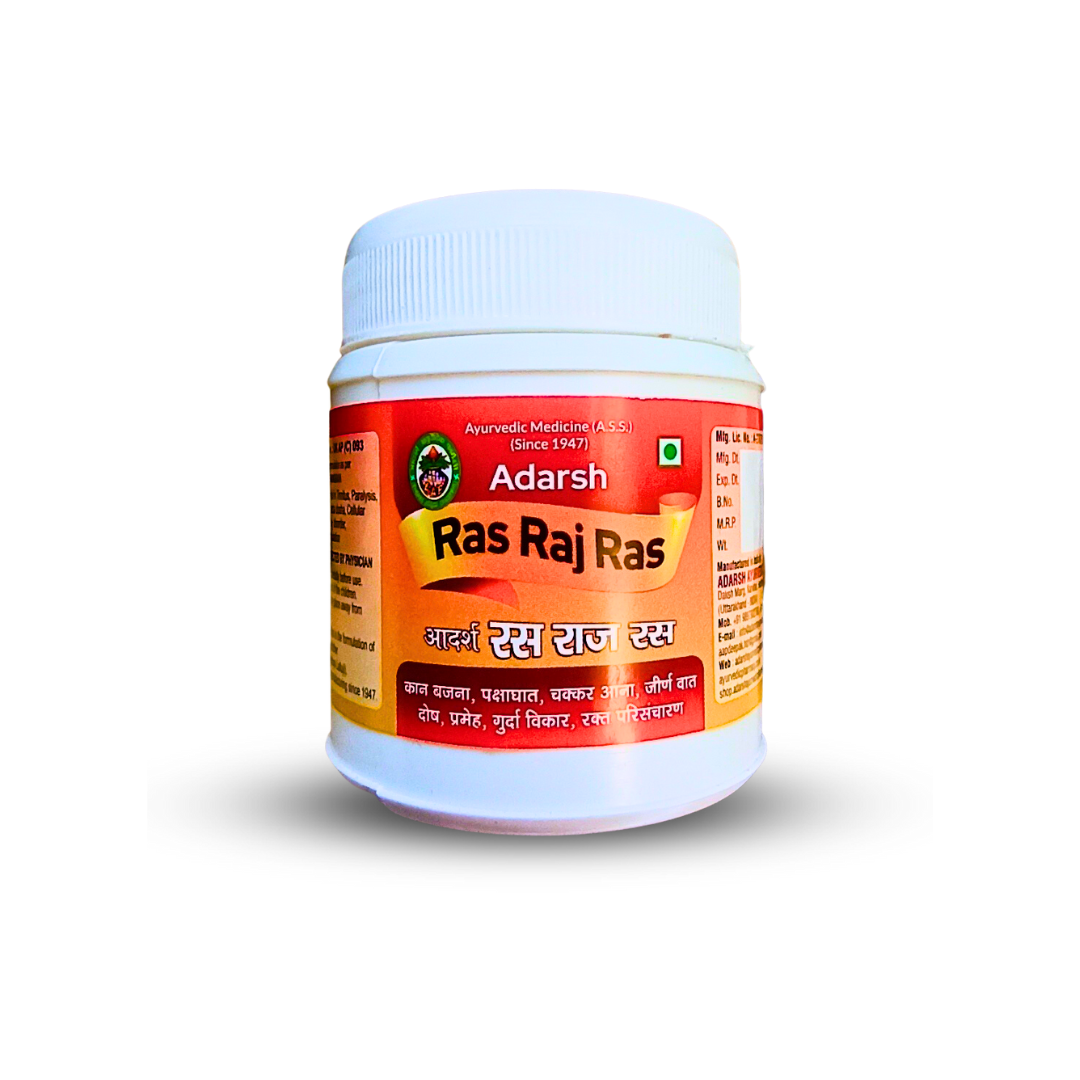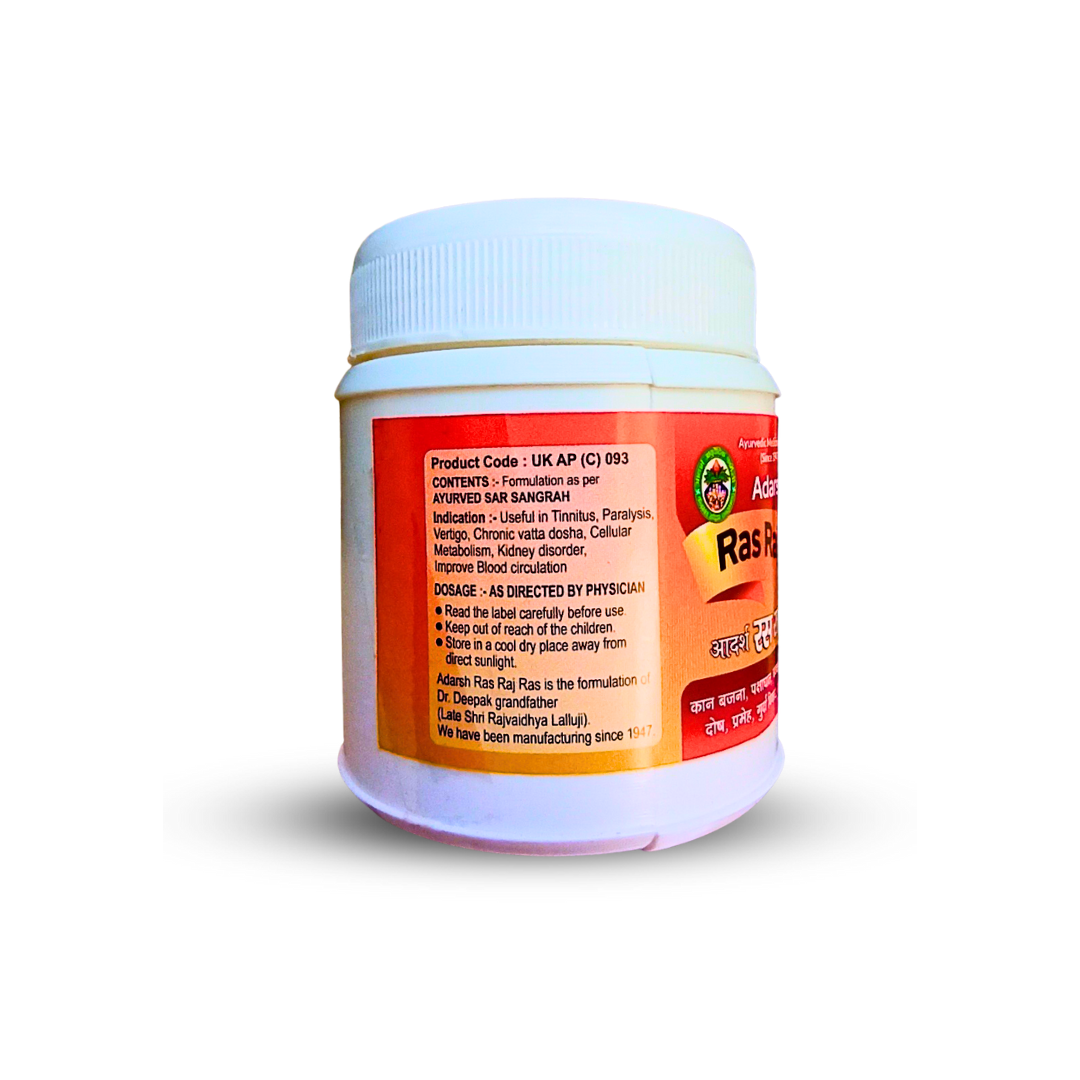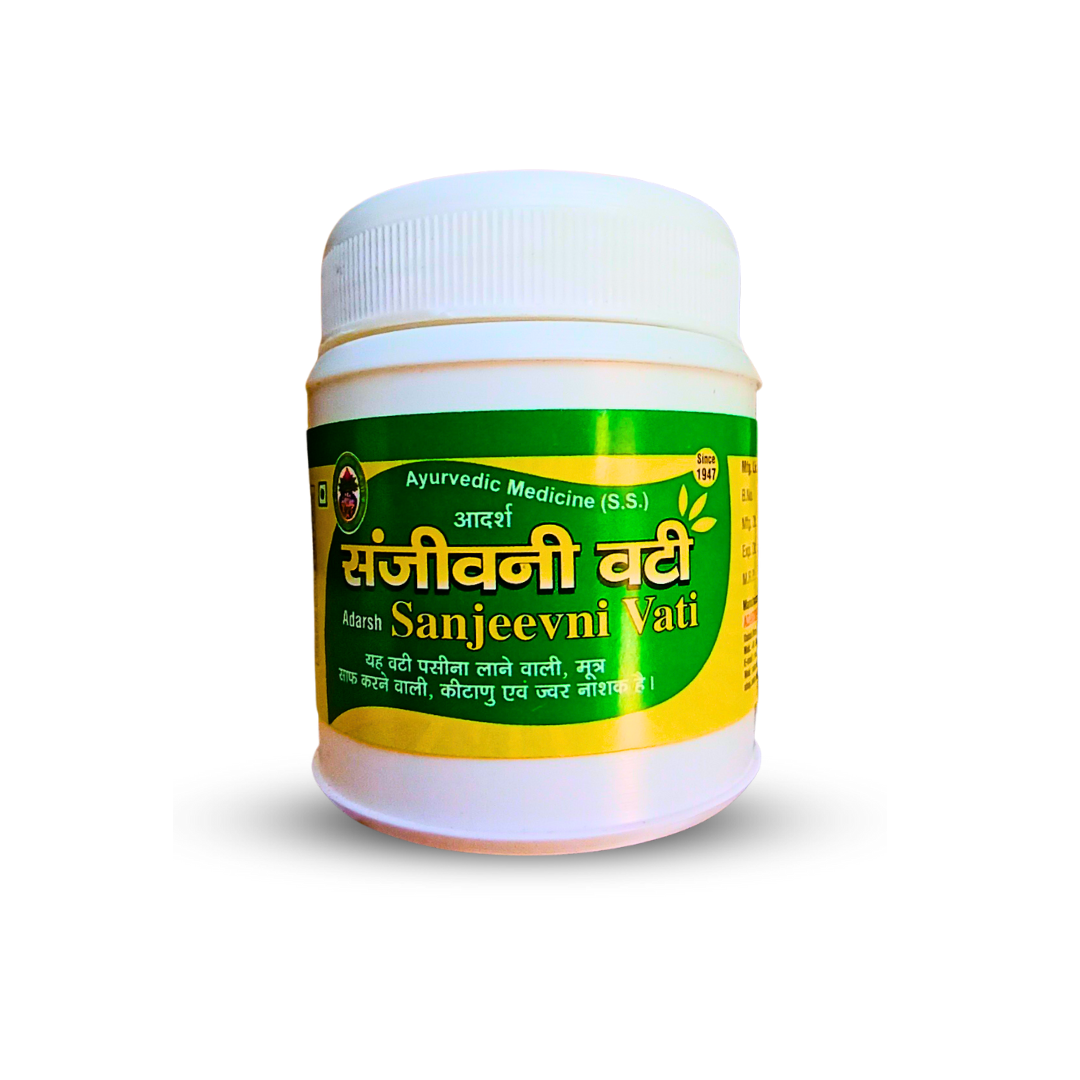Ashtak Vati
₹120
Astak Loh Mandur is believed to work by improving the production of red blood cells and increasing the level of hemoglobin in the blood. It is also thought to have a detoxifying effect on the liver and improve liver function, thereby improving overall health and well-being.
As with any Ayurvedic medicine, it is essential to consult a qualified Ayurvedic practitioner or healthcare professional before using Astak Loh Mandur to ensure its safe and effective use. The dosage and duration of treatment may vary depending on the individual’s condition and other factors.
- Delivery & Return
Delivery
We ship to all over the world. All orders are shipped with a UPS tracking number. Always free shipping for orders over 1000. During sale periods and promotions the delivery time may be longer than normal.Return
Adarsh Ayurvedic Pharmacy will accept exchanges and returns of undamaged box within 30 days of the date of purchase (14 days during the sales period), on presentation of the original till receipt at any store where the corresponding collection is available within the country of purchase. Your return will usually be processed within a week to a week and a half. We’ll send you a Return Notification email to notify you once the return has been completed. Please allow 1-3 business days for refunds to be received to the original form of payment once the return has been processed.Help
Give us a shout if you have any other questions and/or concerns. Email: aapdeepak.hdr@gmail.com Phone: 9897902760
Astak Vati is believed to work by improving the production of red blood cells and increasing the level of haemoglobin in the blood. It is also thought to have a detoxifying effect on the liver and improve liver function, thereby improving overall health and well-being.
As with any Ayurvedic medicine, it is essential to consult a qualified Ayurvedic practitioner or healthcare professional before using Astak Loh Mandur to ensure its safe and effective use. The dosage and duration of treatment may vary depending on the individual’s condition and other factors.
Astak Vati is an Ayurvedic medicine that is commonly used to treat various health conditions such as anemia, liver disorders, jaundice, and skin diseases. It is made from a combination of natural ingredients, including Loh Bhasma (iron oxide), Triphala, and several other minerals and herbs.
buy 10 get one free.
Selflife: 3 years
| Weight | 250 g |
|---|---|
| Dimensions | 14 × 12.5 × 8.5 cm |
| Weight | 100gm, 50gm |
Based on 0 reviews
|
|
|
0% |
|
|
|
0% |
|
|
|
0% |
|
|
|
0% |
|
|
|
0% |
Only logged in customers who have purchased this product may leave a review.
Related Products
Krimi Kutar Ras is an Ayurvedic medicine used for the treatment of intestinal worms and parasitic infections. It is made from a combination of various herbs and minerals, including Vatsanabha (Aconitum ferox), Pippali (Piper longum), Shuddha Gandhak (Purified Sulphur), and Tankana Bhasma (Borax).
However, it is essential to note that the use of Krimi Kutar Ras should be done under the guidance of a qualified Ayurvedic practitioner. Overdose or incorrect usage can cause adverse effects like stomach upset, vomiting, and diarrhea. It is also not recommended for pregnant and lactating women and child.
Haritaki is another important herb in Ayurveda and is considered to be one of the most versatile herbs in the Ayurvedic pharmacopoeia. It is believed to have a wide range of health benefits, including promoting digestion, supporting healthy liver function, and improving cognitive function.
Together, Chitrak and Haritaki are believed to enhance each other’s effects, making Chitrak Haritaki a powerful herbal remedy for digestive disorders and other health conditions.
Chitrak Haritaki is commonly used in Ayurvedic medicine to treat a variety of health conditions, including poor digestion, constipation, abdominal pain, flatulence, anemia, and respiratory disorders. It is typically taken in powdered form, mixed with warm water or milk, or Chitrak Haritaki is an Ayurvedic herbal formulation made from two main ingredients: Chitrak (Plumbago zeylanica) and Haritaki (Terminalia chebula).
Pramehgaj Kesari is believed to have anti-diabetic properties, which can help in regulating blood sugar levels and preventing complications associated with diabetes. It is also believed to have a rejuvenating effect on the body, promoting overall health and well-being.
However, it is essential to note that the use of Pramehgaj Kesari should be done under the guidance of a qualified Ayurvedic practitioner. Overdose or incorrect usage can cause adverse effects like low blood sugar levels, stomach upset, and nausea. It is also not recommended for pregnant and lactating women and people with liver or kidney problems.
Marichiyadi Tail is typically applied topically to the affected area and gently massaged into the skin. The frequency and duration of use can vary based on individual needs and the guidance of a qualified healthcare professional. It is important to note that like all herbal remedies, Marichiyadi Tail may cause allergic reactions or other side effects in some individuals, and should be used with caution.
Marichiyadi Tail is an Ayurvedic herbal oil that is made from a blend of several herbs, including Marich (Black pepper), Ajwain (Trachyspermum ammi), and Karpura (Camphor). This oil is commonly used in Ayurvedic medicine for the treatment of joint pain, muscle pain, and stiffness.
In Ayurveda, Ras Raj Ras is classified as a Rasayana, which means it is believed to have rejuvenating and revitalizing properties that can help improve overall health and vitality.
However, it’s important to note that the use of Ayurvedic medicines should be done under the guidance of a qualified Ayurvedic practitioner, as they can be potentially harmful if not used properly. Additionally, the safety and efficacy of these medicines have not been evaluated by the FDA, so caution should be exercised when using them.
Pathyadi Kwath is an Ayurvedic herbal decoction made from a blend of several herbs, including Haritaki (Terminalia chebula), Bibhitaki (Terminalia bellirica), and Shunti (Zingiber officinale).
According to Ayurvedic principles, Pathyadi Kwath is believed to help support respiratory health, particularly in cases of cough and cold. It is also commonly used to support digestive health, promote healthy metabolism, and alleviate symptoms associated with inflammation.
Amalaki Rasayana is an Ayurvedic herbal formula made from the fruit of the Amalaki tree (Emblica Officinalis), also known as Indian Gooseberry. It is believed to have a rejuvenating effect on the body and is commonly used to promote overall health and well-being.
According to Ayurveda, Amalaki Rasayana is classified as a “Rasayana,” which means it is a rejuvenative tonic for the body and mind. It is also believed to have a powerful antioxidant effect, which helps to protect the body from free radical damage.
Varunadi Kwath is typically prepared by boiling the herbal mixture in water and then straining the decoction before consuming. It is important to note that like all herbal remedies, Varunadi Kwath should be taken under the guidance of a qualified healthcare professional, as it may interact with certain medications or have potential side effects in some individuals.
Varunadi Kwath is an Ayurvedic herbal decoction made from a blend of several herbs, including Varuna (Crataeva nurvala), Gokshura (Tribulus terrestris), and Punarnava (Boerhavia diffusa).
Supari Pak is a herbal Ayurvedic formulation that is commonly used in traditional Indian medicine. It is a sweet and spicy powder made from various herbs and spices, with betel nut (supari in Hindi) being the primary ingredient.
Some of the key ingredients in Supari Pak include betel nut, cardamom, cinnamon, clove, ginger, and honey. These ingredients are believed to have a range of health benefits, such as improving digestion, reducing inflammation, boosting the immune system, and promoting healthy reproductive function.
Supari Pak is typically taken in small doses, usually one to two teaspoons a day.
Vrihat Vat Chintamani Ras (also spelled as Vihrit Vat Chintamani Ras) is a traditional Ayurvedic medicine that is used to treat various conditions related to the nervous system, including paralysis, facial palsy, hemiplegia, and sciatica. It is typically made from a combination of minerals such as purified mercury, sulfur, and mica, along with herbs like ginger, long pepper, and black pepper.
However, it’s important to note that the use of Ayurvedic medicines should be done under the guidance of a qualified Ayurvedic practitioner, as they can be potentially harmful if not used properly. Additionally, the safety and efficacy of these medicines have not been evaluated by the FDA, so caution should be exercised when using them.
Dashmool Ghan is typically taken orally and the dosage and duration of treatment may vary depending on the individual’s needs and the practitioner’s recommendations. It is important to consult with a qualified Ayurvedic practitioner before using Dashmool Ghan, especially if you have a history of medical conditions or are currently taking any medications.
Additionally, it is important to be aware of potential side effects and contraindications before using any herbal supplement. Dashmool Ghan is believed to have several health benefits, particularly for the respiratory and nervous systems. The primary active compounds in Dashmool Ghan include alkaloids, flavonoids, and triterpenoids, which are believed to have anti-inflammatory, analgesic, and antioxidant properties. Dashmool Ghan is commonly used in Ayurvedic medicine for reducing inflammation, pain, and anxiety, and promoting overall health and wellness.
According to Ayurveda, Sanjivani Vati is used to balance the Pitta and Kapha doshas in the body. It is commonly used for the treatment of fever, cough, cold, and other respiratory tract infections. It is also used to boost immunity and improve digestion.
Sanjivani Vati is known for its anti-inflammatory, antipyretic, and immunomodulatory properties. It helps in reducing fever, inflammation, and pain in the body, and also helps in boosting immunity and preventing infections. It is also beneficial for treating digestive disorders such as indigestion and bloating.





























Reviews
There are no reviews yet.